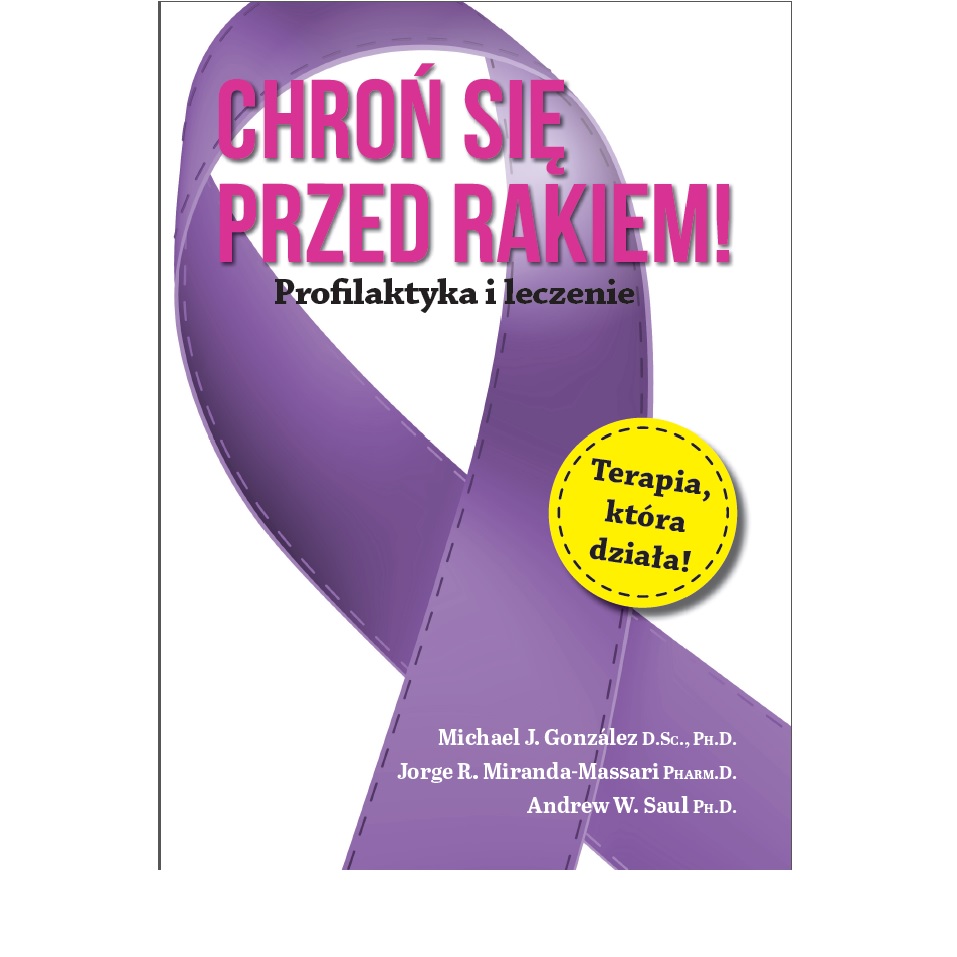|
|
Chron Sie Przed Rakiem |
|
Chron Sie Przed Rakiem |
|
Book Offers Guidance on Nutrition and Supplements in Cancer Treatment
All too often, oncologists give cancer patients little guidance on ways to use nutrition and supplements to aid their recovery and prevent recurrence. The book I Have Cancer: What Should I Do? by Michael J. Gonzalez, DSc, PhD; Jorge R. Miranda-Massari, PharmD; and Andrew W. Saul, PhD, fills this gap. Gonzalez and Miranda-Massari are members of RECNAC II at the University of Puerto Rico. RECNAC II is a research initiative that was inspired by Dr. Hugh Riordan's RECNAC project at the Center for the Improvement of Human Functioning (Wichita, Kansas). Saul is assistant editor of the Journal of Orthomolecular Medicine and author of Fire Your Doctor! and Doctor Yourself.
I Have Cancer: What Should I Do? gives readers the basics about nutrition, supplements, and lifestyle that can be used with conventional cancer treatment. It explains the orthomolecular (high-dose supplement) program that the authors themselves would follow if diagnosed with cancer. It is also the program that Saul uses to prevent cancer.
"Cancer is a multifactorial disease that requires a multifactorial treatment plan: medical, nutritional, and lifestyle changes as well as mental, emotional, social, and spiritual support," assert the authors. "You cannot just take some pills and not change your diet, or change the diet and ignore important emotional or spiritual issues in your life, and then expect that everything will be fine. Any effective approach for cancer must be truly integrated." Keeping that in mind, the authors explain why nutrition is such an important part of any treatment plan. Food choices can reduce toxic effects of oncology treatments, strengthen the immune response, and aid recovery. The dietary guidelines are the basics: a whole-food diet that includes pulses (beans and lentils), whole grains (particularly sprouted grains), nuts, and an abundance of fresh vegetables and fruits. The authors recommend limiting red meat and salt and avoiding sugar and dairy foods altogether, particularly if the cancer is hormone related. Fresh air, exercise, and drinking plenty of pure water are strongly encouraged. The book also discusses dietary supplements that reinforce and augment the benefits of this diet plan.
In his foreword for I Have Cancer: What Should I Do? the late Dr. Abram Hoffer wrote: "Oncologists have to learn not to destroy hope. It is essential that patients not be deprived of hope even with what appears to be terminal cases. I have seen too many of these so-called hopeless cases recover." He tells of a middle-aged woman with kidney cancer that had spread to her back and aorta. Conventional oncologists had no treatment for her, so she entered hospice care. She also consulted Hoffer about orthomolecular treatment. Two years later, hospice discharged her because she was too healthy to die. Six years after consulting Hoffer, the woman was "still well." "Should you be afraid that it might be too late for you," Saul writes, "remember this: some 98 percent of the atoms in your body are replaced every year. And every one of those atoms can only come from what you breathe, drink, and eat."
I Have Cancer: What Should I Do? is well worth the $18.95 cost. The book teaches people self-care and gives much-needed words of hope. It is published by Basic Health Publications.
Andrew Saul is the author of the books FIRE
YOUR DOCTOR! How to be Independently Healthy (reader reviews at
http://www.doctoryourself.com/review.html
) and DOCTOR YOURSELF: Natural Healing that Works. (reviewed at http://www.doctoryourself.com/saulbooks.html
) |
|
|
AN IMPORTANT NOTE: This page is not in any way offered as prescription, diagnosis nor treatment for any disease, illness, infirmity or physical condition. Any form of self-treatment or alternative health program necessarily must involve an individual's acceptance of some risk, and no one should assume otherwise. Persons needing medical care should obtain it from a physician. Consult your doctor before making any health decision. Neither the author nor the webmaster has authorized the use of their names or the use of any material contained within in connection with the sale, promotion or advertising of any product or apparatus. Single-copy reproduction for individual, non-commercial use is permitted providing no alterations of content are made, and credit is given. |
|
|
|
|
| Home | Order my Books | About the Author | Contact Us | Webmaster | |

